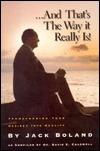

 |

|

The average rating for --And that's the way it really is! based on 2 reviews is 3.5 stars.
Review # 1 was written on 2016-08-03 00:00:00 Roger Chu Roger ChuLike a quick primer on poverty and political economy. Sackrey examines liberal and radical interpretations of poverty. Lots of emphasis is on liberal methods to model and address poverty. Spends most of the book critique that outlook. Four stars might be generous. There could be a lot more. I think I am inflating the value because I haven't found much on this topic. It's strange that I feel like I have really had to hunt to find books that examine capitalism critically. Sackrey acknowledges the benefits of capitalism and even the positive aspects of liberal reform to address poverty, but he also highlights other perspectives that argue poverty is a consequence of capitalism. I've been spending more time on this idea of the origins of poverty and this book helped some. It could have gone in much greater detail. What's unfortunate is that this was written in 1973, and I haven't found anything similar to it written since. Would love some suggestions. I really liked the example of a football players wages and his argument that the wages are not a result of his productivity, worth or demand for the entertainment he provides. All of that is due to the way society is organized. Change the laws, customs, and habits, then the wages will change. After reading this I'd love to read more about "strange" or unlikely occupations nowadays that in other countries of the past received large wages due to the values of the society. A fan of guaranteed annual income. I know pretty much nothing about this. Liberal reform and radical change are complementary rather than antagonistic. Sackrey argues that while liberal reforms have done little to stop poverty and don't address the roots of poverty, they have educated many on the plight of the urban poor and acts as a valuable "first step" toward meaningful radical change. Notes.... Radical views: -being poor is often associated w/ a set of individual characteristics, but these are not causes of poverty....the cause of urban poverty is the entire social system. -the state in an advanced capitalist society serves the needs of its population in direct proportion to the income they receive. -"Poverty is nothing more than the condition of those whose efforts have been described as worthless by those who make the rules." -Radicals believe poverty has less to do w/ the characteristics of the poor than w/ the need of such a system for a "pariah" underclass. The poor is necessary and inevitable consequence of a mature industrial capitalist system. The competitive social order feeds on the existence of losers or the value of winning loses some of its appeal and it reminds the upper class of their relative success. -radicals believe that racism is a function of the nature of the system. The competitiveness and aggressiveness of capitalism exacerbates whatever racial or other prejudices one may have to begin with. -liberal reform believes special characteristics of the poor must be changed to increase their absolute income. The poor also live in a "culture of poverty" were they are raised and acquire at a very young age all the characteristics of poverty. - the liberal war on poverty includes (1) destroying culture of poverty, (2) changing personal characteristics of the poor, and (3) reducing discrimination - liberals believe that poverty can be solved by full employment and growth of the national economy. -federal efforts for welfare were a response to excess rural migration to cities and to quell urban rebellion.... "we take care of the urban poor only after they threaten our own safety rather than working on their problem because we have civilized values inconsistent with their plight." - criticism that the primary purpose of welfare is to guarantee a marginal work force at the bottom of the economic order. With mass unemployment, relief agencies restore order. As turbulence subsides, relief agencies contract, expelling those who are needed to populate the labor market. |
Review # 2 was written on 2020-09-23 00:00:00 Brian Kearney Brian KearneyDialogs between David Bohm and J. Krishnamurti, enjoyable and provoking on the nature of thought, consciousness, and time. A central theme is the suggestion that humanity took a wrong turn in its history, leading to the present day sorrow, conflict, and war. I couldn't help but to feel this is an erroneous presupposition, while tempting, it seems to necessarily lead to the very desire and becoming that both Bohm and Krishnamurti are speaking against-- a psychological becoming where humanity may witness inward revolutions leading to the cessation of suffering, the very suffering caused by desire for becoming. It seems the notion of a "wrong" turn presupposes a division between what is and what could have been. That said, the discussion about time and conscious thought was incredibly insightful; so insightful, in fact, that it led me to question the central theme of humanities wrong turn. |
CAN'T FIND WHAT YOU'RE LOOKING FOR? CLICK HERE!!!